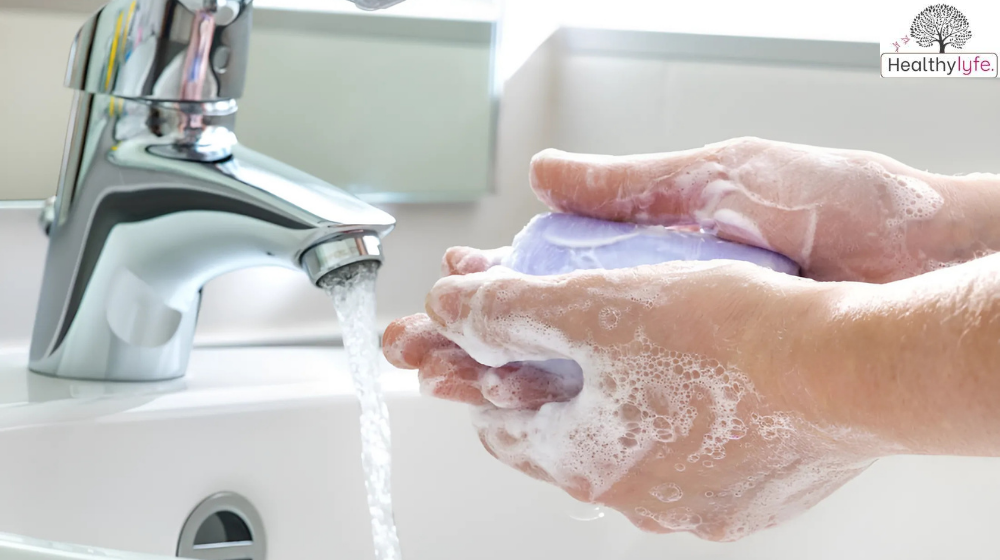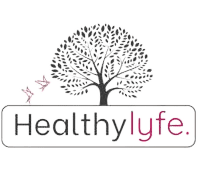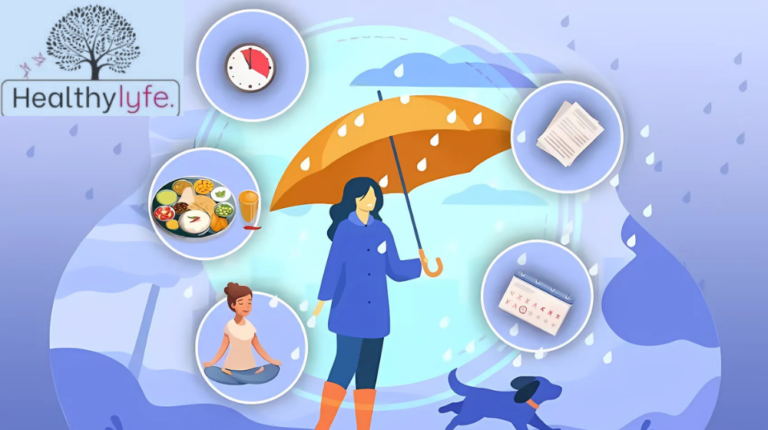Discover essential health tips for monsoon season to stay safe and healthy. Learn how to prevent common illnesses and manage hygiene.
Introduction
The monsoon season brings much-needed relief from the scorching heat, but it also brings challenges such as increased humidity, waterlogging, and the risk of various health issues. To stay healthy and enjoy the rains, it’s important to follow some essential health tips. From preventing infections to maintaining hygiene, these simple steps can help you stay safe and comfortable during the monsoon season. Whether it’s protecting yourself from waterborne diseases or ensuring overall well-being, incorporating these tips into your daily routine will ensure a healthy and pleasant monsoon experience.
How Monsoon Affects Health?

The monsoon season, with its heavy rainfall and damp conditions, can have a significant impact on our health. The increased humidity and stagnant water create a breeding ground for germs and infections, leading to various health concerns such as respiratory issues, skin problems, waterborne diseases, and weakened immunity. Additionally, the sudden changes in weather can make individuals more susceptible to common ailments like cold, flu, and allergies. Understanding how monsoon affects health is essential to take preventive measures and maintain overall well-being during this season.
10 Essential Health Tips for Monsoon [1]
The monsoon season brings much-needed relief from the heat, but it also comes with challenges that can impact health. To stay safe and healthy during this time, it’s important to follow some essential health tips:
Maintain Proper Hygiene
Maintaining proper hygiene is essential for overall health and well-being. It involves practices that prevent the spread of infections and promote a clean and healthy lifestyle. During monsoon or in any season, adhering to good hygiene practices can protect you from various health issues and ensure a higher quality of life.
How to Maintain Proper Hygiene:

- Wash Hands Frequently: Regular handwashing with soap and water is one of the most effective ways to prevent the spread of germs and infections. Wash hands before eating, after using the bathroom, and after coming into contact with surfaces or objects that may be contaminated.
- Keep Surroundings Clean: Regularly clean and disinfect your living spaces, especially in damp areas prone to mold and bacterial growth. Ensure that floors, kitchens, and bathrooms are kept dry and sanitized.
- Use Safe Drinking Water: Always drink boiled or filtered water to avoid waterborne diseases. Avoid consuming street food or water from unknown sources.
- Maintain Personal Hygiene: Bathe daily and change clothes regularly, especially during the monsoon season, to prevent skin infections and allergies. Wear breathable fabrics to reduce fungal and bacterial growth.
- Proper Waste Disposal: Dispose of waste responsibly to prevent breeding grounds for mosquitoes and other harmful insects that cause diseases.
Benefits of Maintaining Proper Hygiene:
- Prevents Illness: Regular hygiene practices reduce the risk of infections, including respiratory issues, skin problems, and waterborne diseases.
- Improves Mental Health: A clean and organized environment contributes to a sense of well-being and reduces stress.
- Boosts Immunity: Keeping the body and surroundings clean helps strengthen the immune system against diseases.
- Enhances Quality of Life: Good hygiene practices lead to healthier living conditions, promoting overall happiness and productivity.
Stay Hydrated
Staying hydrated is essential for maintaining overall health and well-being, especially during seasons like summer and monsoon when the body loses fluids through sweating and increased humidity. Proper hydration helps regulate body temperature, supports digestion, and keeps your skin healthy. Here’s how to stay hydrated and the benefits it provides:
How to Stay Hydrated:
- Drink Water Regularly: Aim to drink at least 8-10 glasses of water daily. Increase intake during physical activities or in hot, humid conditions.
- Eat Hydrating Foods: Include fruits and vegetables with high water content, such as cucumber, watermelon, oranges, and celery.
- Limit Sugary and Caffeinated Beverages: While they can provide temporary hydration, excessive intake may lead to dehydration over time.
- Carry a Reusable Water Bottle: Carrying a bottle ensures you stay hydrated throughout the day, especially when traveling or exercising.
Benefits of Staying Hydrated:
- Improves Physical Performance: Proper hydration supports better endurance and muscle function.
- Boosts Brain Function: Staying hydrated helps with focus, memory, and overall cognitive function.
- Aids Digestion: Water helps break down food and supports the absorption of nutrients.
- Maintains Healthy Skin: Hydrated skin appears clearer, softer, and more radiant, reducing issues like dryness and dullness.
- Regulates Body Temperature: Water plays a crucial role in regulating body temperature, preventing overheating during physical exertion or hot weather.
Eat a Healthy Diet
Eating a healthy diet is essential for maintaining overall well-being and preventing various health issues. A balanced diet provides the necessary nutrients, vitamins, and minerals that support bodily functions and boost the immune system. However, understanding how to adopt a healthy diet and the benefits it offers is crucial for long-term health.
How to Eat a Healthy Diet
- Balance Your Macronutrients: Ensure your meals include a mix of carbohydrates, proteins, fats, and fiber. This balance supports energy levels, muscle repair, and healthy digestion.
- Incorporate a Variety of Foods: Eating a wide range of fruits, vegetables, whole grains, lean proteins, and healthy fats ensures that your body receives all essential nutrients.
- Limit Processed Foods: Minimize the intake of processed foods, sugary snacks, and unhealthy fats. Focus on whole, unprocessed foods for better nutrition.
- Stay Hydrated: Drink plenty of water throughout the day to support hydration, digestion, and overall health.
- Mindful Eating: Eat slowly, chew your food thoroughly, and avoid overeating. This promotes better digestion and prevents overeating.
Benefits of Eating a Healthy Diet
- Improved Physical Health: A balanced diet supports optimal bodily functions, reducing the risk of chronic diseases like diabetes, heart disease, and obesity.
- Enhanced Mental Health: Proper nutrition can improve mood, cognitive function, and mental clarity. It helps manage stress and anxiety.
- Weight Management: Healthy eating habits promote weight loss or maintenance by controlling calorie intake and improving metabolism.
- Boosted Immune System: A diet rich in fruits, vegetables, and nutrients enhances immunity, making the body better equipped to fight off infections and illnesses.
- Increased Energy Levels: Balanced meals provide sustained energy throughout the day, reducing fatigue and improving productivity.
- Better Digestion: High-fiber foods and whole grains aid in digestion and prevent digestive issues like bloating and constipation.
Protect Against Mosquitoes
Mosquitoes become more active during the monsoon season, bringing with them the risk of diseases like dengue, malaria, and chikungunya. Protecting yourself from mosquito bites is essential to stay healthy and avoid these illnesses. Thankfully, there are easy ways to keep mosquitoes at bay.
How to Protect Against Mosquitoes:
- Use Mosquito Repellent: Apply mosquito repellent to your skin and clothing to create a barrier against bites.
- Wear Long-Sleeved Clothes: Covering your arms and legs helps reduce skin exposure to mosquitoes.
- Sleep Under Mosquito Nets: If you sleep in a room with open windows or doors, a mosquito net can provide a safe and comfortable rest.
- Eliminate Stagnant Water: Mosquitoes breed in standing water, so make sure to get rid of any stagnant water in places like buckets, flower pots, and drains.
- Install Mosquito Screens: Adding screens to windows and doors keeps mosquitoes from entering your home.
- Use Natural Remedies: Essential oils like eucalyptus, lavender, or citronella can act as natural mosquito repellents.
Benefits of Protecting Against Mosquitoes:
- Prevents Illnesses: By reducing mosquito bites, you lower the risk of serious diseases like dengue and malaria.
- Better Sleep: Nobody likes being bitten while trying to sleep. Mosquito protection ensures a more comfortable, restful night.
- Keeps Your Space Clean: Eliminating stagnant water and using screens helps keep your surroundings clean and mosquito-free.
- Improved Health: Fewer bites mean fewer chances of falling sick, allowing you to enjoy a healthier season.
Be Cautious About Footwear
When it comes to staying healthy, your footwear plays a crucial role, especially during certain seasons like the monsoon. Wearing the right shoes and taking care of your feet can help prevent common issues like fungal infections, discomfort, and even injuries.
How to Be Cautious About Footwear:
- Choose Waterproof Shoes: During the monsoon, opt for waterproof or water-resistant footwear to keep your feet dry and protected from damp conditions.
- Wear Breathable Materials: Choose shoes made from materials that allow your feet to breathe, reducing the risk of fungal infections.
- Avoid Tight Shoes: Wet feet can lead to discomfort and infections. Wear shoes that fit well and provide enough space for your feet to avoid rubbing or irritation.
- Use Flip-Flops or Sandals: When walking through puddles or areas with waterlogging, wear sandals or open-toe shoes to keep your feet dry.
Benefits of Being Cautious About Footwear:
- Prevents Fungal and Skin Infections: Reduces the risk of infections caused by dampness.
- Avoids Discomfort: Keeps feet dry and comfortable, especially when walking long distances.
- Minimizes Slips and Falls: Waterproof shoes offer better grip and prevent slipping on wet surfaces.
- Improves Overall Foot Health: Proper footwear helps maintain healthy feet, reducing the risk of blisters and foot-related problems.
Avoid Waterlogged Areas

During the monsoon season, waterlogging can lead to health risks like infections and accidents. To stay safe, it’s important to avoid waterlogged areas whenever possible. Here’s how you can do that and the benefits it brings:
How to Avoid Waterlogged Areas:
- Plan Your Routes: Choose streets and paths that are less likely to be flooded or have standing water.
- Wear Proper Footwear: Use waterproof or sturdy shoes to avoid slipping or getting your feet wet.
- Stay Informed: Keep an eye on local weather updates and flood warnings to avoid risky areas.
- Use Elevated Routes: Walkways or bridges above ground can help you avoid flooded areas.
Benefits of Avoiding Waterlogged Areas:
- Reduced Risk of Infections: Exposure to stagnant water can lead to diseases like leptospirosis or skin infections.
- Prevention of Accidents: Slippery roads and flooded areas increase the risk of slips, falls, and injuries.
- Better Hygiene: Keeping away from waterlogged areas helps maintain hygiene and prevents contamination.
Manage Skin and Hair Care
The monsoon season can take a toll on your skin and hair, making it important to take extra care to keep them healthy and radiant. By following a few simple steps, you can protect your skin and hair from dryness, infections, and damage caused by damp weather.
How to Manage Skin and Hair Care:
- Keep Skin Clean and Dry: Moisture from rain and humidity can lead to skin issues like acne, fungal infections, and dullness. Wash your face and body regularly, and avoid staying in wet clothes for too long.
- Moisturize Regularly: Use a lightweight, non-greasy moisturizer to keep your skin hydrated without feeling sticky. For hair, apply a good conditioner to prevent frizz and keep it smooth.
- Use Antifungal Products: Prevent fungal infections on the skin and scalp by using antifungal creams or powders. This is especially important for areas prone to sweating, like underarms and feet.
- Protect Your Hair: Avoid excessive use of heat styling tools and protect your hair from rain and humidity with hair oils or leave-in conditioners.
- Eat a Balanced Diet: A diet rich in vitamins and antioxidants helps maintain healthy skin and hair by boosting your immunity and nourishing from within.
- Stay Hydrated: Drinking plenty of water helps keep your skin moisturized and your hair healthy.
Benefits of Good Skin and Hair Care:
- Healthy Skin: Reduces the risk of skin infections, acne, and dryness.
- Shiny Hair: Prevents frizz and damage caused by humidity, keeping your hair smooth and manageable.
- Boosted Confidence: Healthy skin and hair improve your overall appearance and self-esteem.
Strengthen Immunity
Having a strong immune system is crucial for staying healthy, especially during seasonal changes like the monsoon. A strong immune system helps the body fight off infections and stay resilient against diseases. By making simple lifestyle changes, you can boost your immunity naturally.
How to Strengthen Your Immunity:
- Eat a Balanced Diet: Include plenty of fruits, vegetables, whole grains, and lean proteins. These provide essential vitamins and minerals that support your immune system.
- Stay Hydrated: Drinking enough water helps flush out toxins and keeps your body functioning smoothly.
- Get Enough Sleep: Sleep is essential for your body to repair and strengthen itself. Aim for 7-8 hours of quality sleep each night.
- Exercise Regularly: Physical activity helps improve blood circulation and boosts your immunity. A simple walk or yoga session can work wonders.
- Manage Stress: Chronic stress weakens the immune system. Practicing relaxation techniques like meditation or deep breathing can help reduce stress.
- Avoid Unnecessary Antibiotics: Overuse of antibiotics can weaken your immunity. Only take them when prescribed by a doctor.
- Limit Sugary Foods: Excess sugar can suppress your immune system. Opt for healthier alternatives like honey or natural sweeteners.
Benefits of a Strong Immune System:
- Fewer Illnesses: A robust immune system means you’re less likely to catch colds, flu, or other infections.
- Faster Recovery: If you do get sick, your body will recover more quickly.
- Better Overall Health: Strong immunity promotes overall well-being and keeps your energy levels high.
Conclusion
The monsoon season brings both joy and challenges, but with the right precautions, you can stay safe and healthy. By following simple health tips such as maintaining hygiene, protecting against waterborne diseases, managing your diet, and staying active, you can ensure a healthy monsoon experience. Prioritizing your well-being during this season will not only help prevent illnesses but also allow you to enjoy the beauty of the rains worry-free. Stay proactive, stay safe, and make the most of the monsoon season while keeping your health intact.
FAQs About Health Tips
Why is staying hydrated important during monsoon?
Drinking clean water prevents dehydration, flushes out toxins, and boosts immunity to combat waterborne diseases.
What types of food should I avoid during the monsoon?
Avoid street food, raw salads, fried foods, and uncooked seafood to minimize the risk of infections.
How can I prevent waterborne diseases like cholera and typhoid?
Drink only boiled or filtered water, avoid contaminated water sources, and maintain good hand hygiene.
What fruits and vegetables are safe to eat during monsoon?
Stick to seasonal fruits like bananas, apples, and pomegranates, and thoroughly wash or cook vegetables like spinach, cauliflower, and carrots.
How do I protect myself from mosquito-borne diseases like dengue and malaria?
Use mosquito repellents, wear long-sleeved clothing, and eliminate stagnant water around your home.
What precautions should I take to avoid fungal infections?
Keep your skin dry, wear breathable footwear, and avoid staying in wet clothes for long.
How can I boost my immunity during the monsoon?
Include immune-boosting foods like turmeric, ginger, garlic, and vitamin C-rich fruits in your diet.
Why is personal hygiene critical during monsoon?
Personal hygiene prevents the spread of germs, especially as the damp environment promotes bacterial growth.
What is the best way to handle damp clothing or wet shoes?
Dry them thoroughly in sunlight or use a dryer to prevent fungal growth.
Is it safe to exercise outdoors during the monsoon?
Avoid outdoor exercise during heavy rains; instead, opt for indoor workouts to maintain fitness.
What should I do if I get caught in the rain?
Change into dry clothes immediately, wash your feet thoroughly, and drink warm fluids to prevent illness.
How can I prevent digestive issues like indigestion and food poisoning?
Eat freshly cooked meals, avoid reheated food, and practice portion control.
What is the importance of wearing proper footwear during monsoon?
Wear waterproof and anti-slip footwear to avoid falls and fungal infections.
How can I care for my hair during monsoon?
Wash your hair regularly, use a mild shampoo, and avoid letting your scalp stay damp.
What skincare routine should I follow during monsoon?
Cleanse your face twice daily, use a non-greasy moisturizer, and apply sunscreen even on cloudy days.
What precautions should children take during monsoon?
Ensure they wear waterproof clothing, avoid playing in puddles, and consume hygienic food and water.
What are common monsoon-related illnesses?
Cold, flu, dengue, malaria, leptospirosis, typhoid, and fungal infections are prevalent during the rainy season.
How do I prevent mold and dampness at home?
Use a dehumidifier, keep windows open during dry periods, and clean with anti-fungal solutions.
Why is drinking herbal teas beneficial during monsoon?
Herbal teas with ingredients like tulsi, ginger, and honey improve digestion, immunity, and combat cold symptoms.
What should I carry in a monsoon emergency kit?
Include a raincoat, umbrella, hand sanitizer, water bottle, first-aid supplies, and waterproof bags.
By healthylyfe


